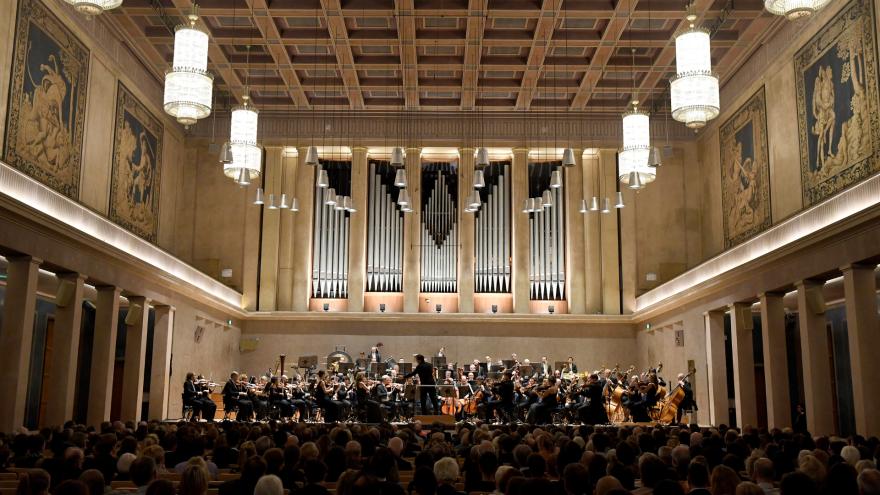Basque conquest in Munich’s Herkulessaal

The Basque National Orchestra took to the stage of the prestigious Herkulessaal in Munich with confidence, energy and conviction. The orchestra impressed and triumphed. “I think people couldn’t believe how extraordinary this orchestra is”, said Robert Treviño.
About Munich
A city which is home to three world-class large symphony orchestras, three chamber orchestras and four concert halls with a capacity of almost 6,000 needs no introduction as the powerhouse of Central-European classical music. Having managed to secure a place in the city’s concert programme constitutes a milestone in itself for the Baskisches Nationalorchester. What’s more, the hang-up free programme combining its Basque roots—thanks to Sorozábal—with performances of such great universal composers as Elgar and Mahler sparked the curiosity of the public and the media. Yesterday, in Munich’s Herkulessaal, the Basque National Orchestra gave a stunning performance and reached the highest heights.
Sorozábal...
The Basque National Orchestra is a natural ambassador of Basque culture and on this occasion gave free reign to its roots, opening the concert in Munich with a selection of the Siete lieder written by Sorozábal on German soil, in Leipzig, in 1929. The Basque composer likely never imagined that his music, inspired by the poetry of Heinrich Heine, laden with Basque rhythms and modulations and dedicated to different figures from Basque culture, would be performed in one of the temples of classical music. Listening to the German soprano Mojca Erdmann sing the lieder “Amesetan”, “Lotoren lorak” and “Ez dot sinisten” in Basque was an emotional experience for many of those gathered in the concert hall, and one which confirmed the Basque National Orchestra's role as an instrument for exporting Basque music and culture to the most acclaimed venues. This sentiment was echoed by the Basque Government’s Minister for Culture and Political Policy and President of the orchestra, Bingen Zupiria. Present for the performance, he was “moved by the number of people who attended the concert” and by the fact that the conductor was summoned back to the stage seven times by the rounds of applause. Zupiria added that “if we want to join the world as a country, as well as our industry and economy we have to export culture. The Basque National Orchestra has demonstrated this, and it is a significant example.” Zupiria was also delighted by the high standard of the performance.
...followed by Elgar and Mahler
After opening its performance with Sorozábal, the orchestra began its journey through a universal repertoire much more familiar in these lands. First were Elgar’s Enigma Variations, already performed in Linz and well-rehearsed by the musicians. Yesterday's review of our concert in Linz in the Austrian paper Nachrichten remarked that “In the most famous variation, Nimrod, the orchestra cultivated a fascinating piano culture”, concluding that it was a “coherent concert, with a more than impressive performance of Mahler’s Fourth.”
On that basis, the orchestra’s performance was confident and compelling. Mahler’s Fourth is one of the German composer's most popular symphonies. In fact, the piece has thrice featured in concert programmes in Munich over the past 15 days and will be performed again mid-month by the Munich Philharmonic conducted by Valery Gergiev. On another note, Robert Treviño’s international career is continuing apace. He conducted the Munich Philharmonic in this very concert hall (still ringing with the memory of Mahler's Fifth Symphony) and is becoming a renowned conductor for his performances of Mahler. Robert Treviño has known from the outset that he wanted to take to the stage in Munich with his orchestra, with a big programme, and with Mahler on the music stands, enabling them to show off their strengths and summoning all of their abilities, confidence, conviction and energy. The entire performance was true to his vision. Well-coordinated and in permanent connection with Treviño, the orchestra's rendition of Mahler's Fourth was lauded with a lengthy applause from the public which brought the conductor back to the stage seven times. Mojca Erdmann, now completely recovered after taking ill in Linz, concluded her part with an elegant and refined description of the heavenly pleasures alluded to by the composer in the final movement of the symphony. The orchestra couldn’t leave before giving two encores: the first, Morgen, from the Four Last Songs by R. Strauss, with the soloist Erdmann; and the second, the Intermezzo from La boda de Luis Alonso by Giménez, performed by the orchestra alone.
Maestro Treviño was more than pleased at the end of the concert and wanted to highlight his excitement at everything that took place over the course of the evening. “The audience was incredible, the orchestra was happy, the performance was outstanding, and I think people couldn't believe how extraordinary this orchestra is. I’m very proud of them”, he said.
In addition to the Minister for Culture and President of the orchestra, Bingen Zupiria, also among the audience was the Spanish consul in Munich, Francisco Pascual de la Parte, as well as representatives from the Instituto Cervantes, the Director of the SPRI office in Munich, María Sarricolea, and members of the Basque community resident in the city. All were delighted and taken aback by the quality of the orchestra, including Helmut Pauli, the local programmer in charge of including the orchestra in the Herkulessaal calendar and who is accustomed to the city's intense and celebrated musical life: “The orchestra is comparable to the great ensembles—it has the same level, an extraordinary sound, and has brought out facets of Mahler that we didn’t expect.” “It has been an enormous pleasure to bring them to Munich.”
Our tour continues
This Saturday we return to Austrian territory for a debut appearance in Bregenz. In store is a sold-out concert in the Festspielhaus, a 1,600-seat venue on the shores of Lake Constance. The concert will again feature Sorozábal and Mahler, and we’ll welcome the prestigious violinist Vadim Gluzman for the performance of Prokofiev’s Violin Concerto No.2. This is another very strong programme featuring two experienced soloists and, once again, a mix of Basque and universal music. Saturday, December 8th at 19:30 will mark the last of the three concerts in our tour.
Bira ez da amaitu
Larunbatean berriz itzuliko gara Austriara, oraingoan Bregenzera, Orkestrarentzat lehendabizikoz. Festspielhausen izango dugu entzunareto, Konstantza lakuaren ertzean dagoen 1.600 eserlekuko aretoa, zeinerako sarrera guztiak agortu egin diren dagoeneko. Sorozabal eta Mahlerrekin jarraituko dugu han, eta Vadim Gluzman biolinjole prestigiodunari sarrera emango diogu, Prokofieven 2. Biolinerako kontzertuaren interpretazioarekin. Programa hau ere indartsua izango da, ibilbide luzeko bi solistarekin eta, berriz ere, musika euskalduna eta unibertsala uztartuko ditugu. Larunbatean, abenduak 8, 19:30ean, izango da kontzertua, bira honetarako programatu ditugu hiruetako azkenekoa.
Concerts & Tickets February













